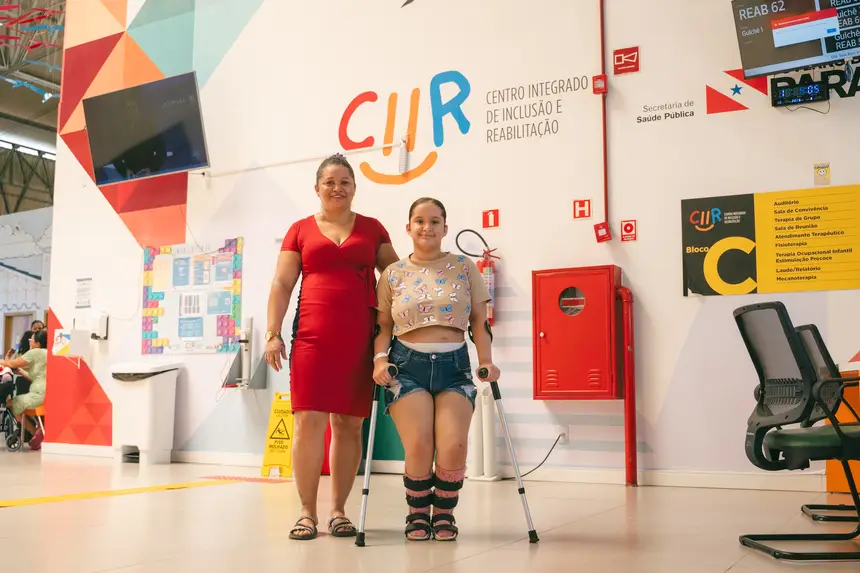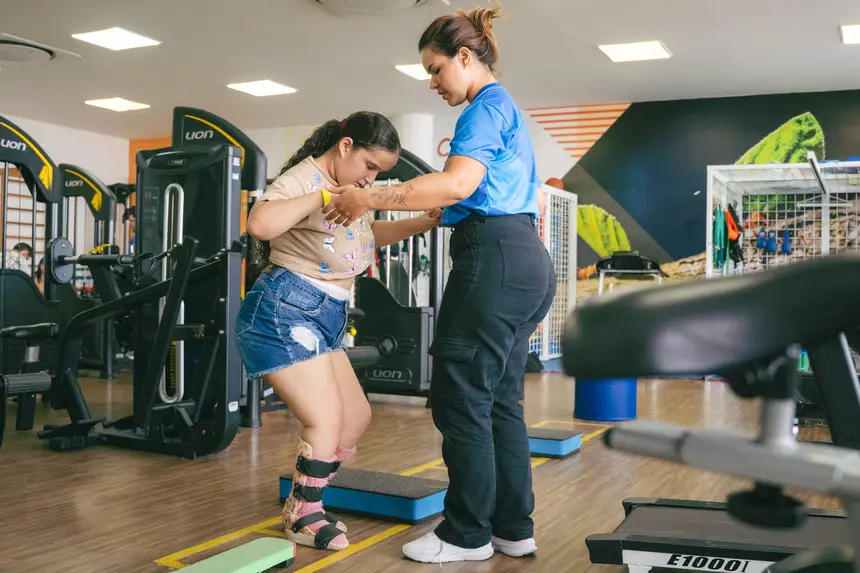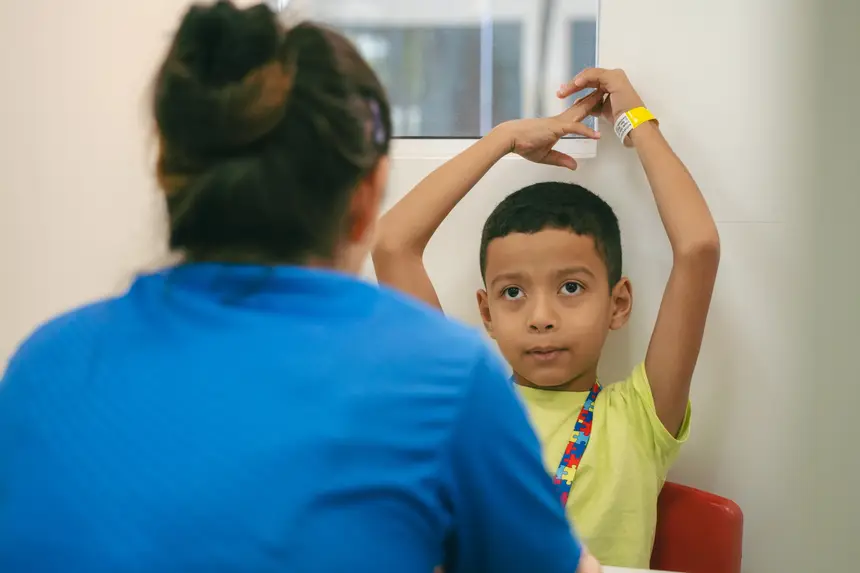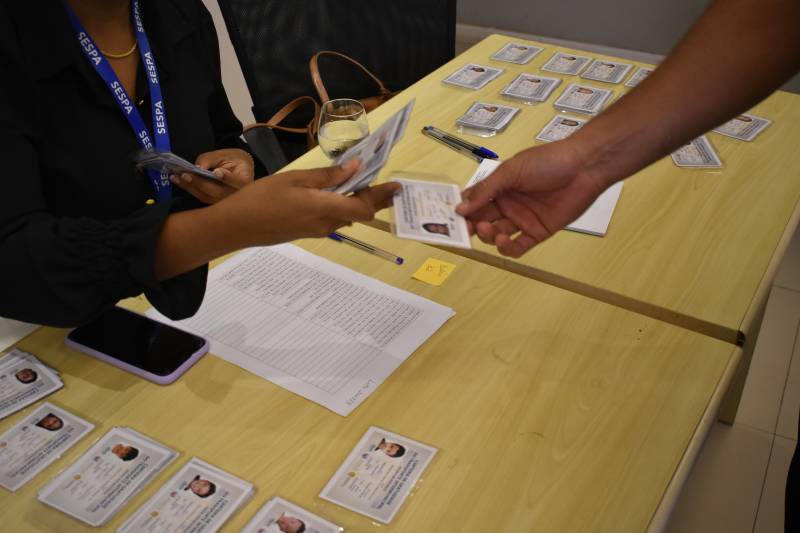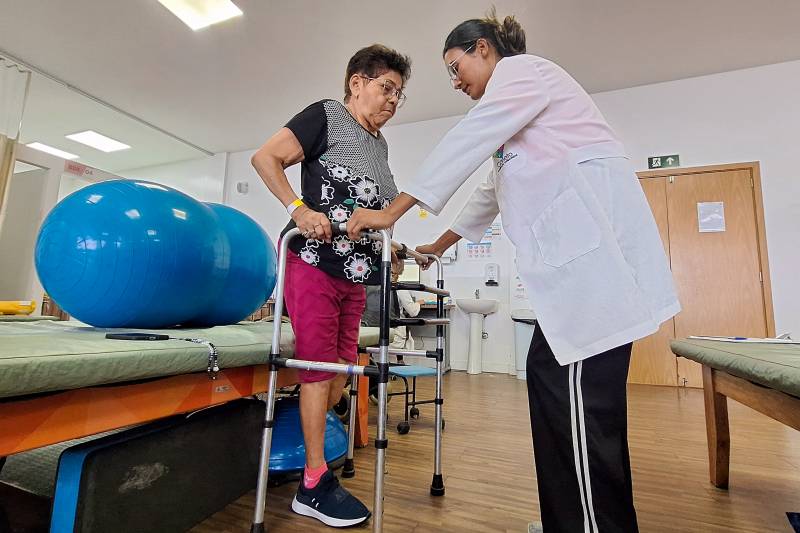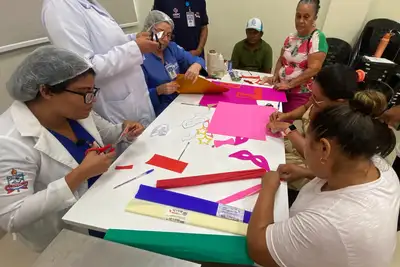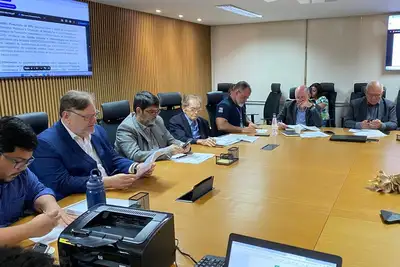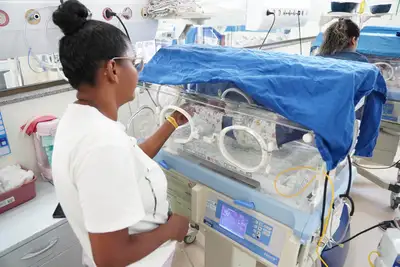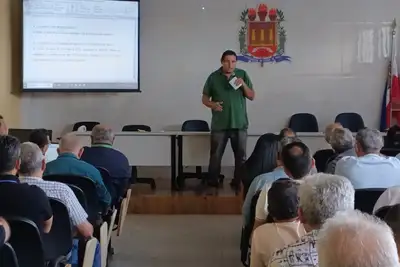Government of Pará guarantees care and support to People with Disabilities
In the last six years, the State has delivered more than 18,000 wheelchairs and issued over 49,000 free passes, ensuring rights and quality of life
The guarantee of inclusion, public policies, and quality of life for people with disabilities are activities constantly developed by the government of Pará, through the State Department of Public Health (Sespa). On the occasion of the National Day of Struggle for People with Disabilities, celebrated this Sunday (21), the aim is to raise awareness in society about the importance of improving the means of inclusion for these citizens in society, whether they have hearing, physical, intellectual, or visual disabilities.
In Pará, 8.3% of people have some type of disability, according to the "2022 Demographic Census: People with Disabilities and People Diagnosed with Autism Spectrum Disorder - Preliminary Results of the Sample," released in May of this year by the Brazilian Institute of Geography and Statistics (IBGE). The survey is sample-based and refers to visual, auditory, motor, and mental disabilities – equivalent to about 720,000 people.
Through Sespa, the State Coordination for People with Disabilities (Ceped) has intensified, especially in the last six years, attention to this segment of the population throughout the State. From 2019 to 2024, 18,949 wheelchairs were delivered, in partnership with the actions of TerPaz, through coordination with the Strategic Secretariat for Citizen Articulation (Seac). In the same period, Sespa issued 49,016 free passes.
Regarding people with Autism Spectrum Disorder (ASD), the State Coordination of Policies for Autism (Cepa) has already delivered more than 16,000 Identification Cards for People with Autism Spectrum Disorder (Ciptea), which are important tools for guaranteeing rights for the autistic population and their families, prioritizing service in various areas of public and private services, especially in health, education, and social assistance. Cepa develops all actions aimed at people with ASD.
"These deliveries, in some way, guarantee the right to go and come for the person with a disability and their companion," emphasizes the coordinator of Ceped, Iracy Tupinambá, highlighting the public policies developed by the State government that are helping these people overcome barriers. "What limits people with disabilities is the environment that imposes barriers," she highlights.
Access to services
In this sense, Sespa provides guidance on how people with disabilities can access the seven programs and services aimed at People with Disabilities through the Unified Health System (SUS): Ostomy, Urinary Catheter, Orthotics and Prosthetics and Auxiliary Means of Mobility, Muscular Dystrophy, Multiple Sclerosis and Amyotrophic Lateral Sclerosis, Oxygen Therapy, and Free Pass.
To do this, first, the SUS user needs to go to a Basic Health Unit (UBS) to be referred to a Specialized Reference Unit (URE), except for orthotics and prosthetics, which can be requested directly at the Demétrio Medrado Specialized Reference Unit in Belém.
At these locations, multidisciplinary teams assess cases for the start of follow-up and rehabilitation, as well as prescribe and request orthotics, prosthetics, and auxiliary means of mobility, such as wheelchairs.
Assistance that changes lives
Among the many users of these services is little Nicolas Rocha, nine years old, diagnosed with ASD and a user of the Integrated Center for Inclusion and Rehabilitation (CIIR), where he has been assisted for three years. During this time, he has undergone therapies, exams, and consultations.
According to his full-time caregiver, housewife Edilza Alves, the child is evolving with the therapies. "He wasn't socializing. Now he plays with the kids, goes to school, is studying properly, participates, interacts, talks to the teacher, does his homework," she reports, mentioning the importance of the National Day of Struggle for People with Disabilities.
"In this sense, I advise parents to observe their children's behavior, because, in my case, I took a long time to accept it, even noticing differences. We first have to accept, then we have to investigate, seek medical care, because that is the right thing to do," she advises.
Another user is Ângela Andrade, twelve years old, attended by CIIR for a year and, during this time, according to her mother Ruth Andrade, she has already had consultations, exams, and therapies, in addition to receiving orthotics, a wheelchair, a shower chair, a walker, and crutches.
According to Ruth, Ângela's care was and is very important. We arrived here, and she didn't have all this development that she is having. She used to use a wheelchair; now she doesn't anymore. She has moved to crutches. She is also using a prosthesis. She is going to school much better. Her psychological development has also improved a lot. Everyone here at CIIR has become her friend. They are very well-mannered. I have nothing to complain about," she says.
Get to know the services offered by Sespa to People with Disabilities
1. Ostomy
Ostomy, or elimination stoma, is a surgical procedure performed when there is a need to create a new pathway for eliminating urine and feces. The Ostomy Program operates at the Presidente Vargas Reference Unit and provides patients with collection bags, supplies, and all necessary guidance for correct use, counting on a multidisciplinary team formed by doctors, nurses, social workers, psychologists, and nutritionists. Currently, the total number of registered patients is 2,583 active, who need permanent or temporary ostomy.
2. Orthotics and prosthetics and auxiliary means of mobility
The service operates at the Demétrio Medrado URE and provides orthopedic orthotics and prosthetics. As explained by the state coordinator for People with Disabilities at Sespa, Iracy Tupinambá, in the case of orthotics and prosthetics, the user can go directly to the Demétrio Medrado URE as it is a citizen's right based on accessibility regulations. "To be registered, just bring personal documents and the medical report," she informed.
3. Urinary catheter
This service provides the urinary catheter (urethral catheter) to wheelchair users or those with urinary system problems. Currently, the program also operates at the Demétrio Medrado URE.
4. Muscular dystrophy
The program operates at the Teaching-Assistance Unit of Physiotherapy and Occupational Therapy (UEAFTO) of the State University of Pará (UEPA) and offers rehabilitation for patients with muscular dystrophies, which are genetic diseases linked to the X chromosome that primarily affect muscles and cause their progressive degeneration.
The transportation of these patients to the unit is the responsibility of the State Coordination for People with Disabilities (Ceped), so that patients do not miss rehabilitation sessions.
5. Multiple sclerosis and amyotrophic lateral sclerosis
Multiple Sclerosis is a disease restricted to the central nervous system (brain and spinal cord); Amyotrophic Lateral Sclerosis (ALS) is another disease with completely different causes, symptoms, and progression. It affects the nervous system in a degenerative and progressive manner, and over time, the patient loses functional capacity and the ability to care for themselves. Currently, care is provided at the outpatient clinic of the Ophir Loyola Hospital (HOL).
6. Home oxygen therapy
This is an effective therapy for users with respiratory failure. The goal is to maintain adequate oxygenation levels to avoid hypoxemia (low concentration of oxygen in the blood).
The Home Oxygen Therapy Program has technical cooperation with the team of the "Better at Home" program, executed by the Health Department of Belém (Sesma), and also operates throughout the State through the other 12 Regional Health Centers, providing the necessary equipment for the assistance of these patients in their own homes. With this support provided by Ceped, 275 patients remain in their homes.
7. Free pass
The seventh program is the Free Pass, which is developed in conjunction with the Information and Communication Technology Company of Pará (Prodepa) and the Regulatory and Control Agency for Public Transport Services (Artran-PA), providing the card that guarantees the right to go and come in the 144 municipalities of the State of Pará.
The evaluation and registration of users are done by Sespa, the card is made by Prodepa, financed by Artran-PA, and distributed by Ceped of Sespa.
To obtain the free pass document, users, depending on the type of disability they present, can go directly to the following Units:
URES Reduto: Av. Visconde de Souza Franco, nº 600 – Phone 3204-3716 (physical, neurological, lupus, and chronic renal disabilities);
URES Presidente Vargas: Av. Presidente Vargas, nº 513 – Phone 3110-6250 (auditory, visual, cardiological, and ostomized disabilities);
URES Marcello Cândia: BR-316, Km 12, Av. João Paulo II (street of the Divine Providence Hospital), Marituba - Phone: 3256-0223 and 3256 (sequelae of leprosy)
Uredipe: Av. Senador Lemos, s/n – Phone 3244-3535 (IST/AIDS)
URES Demétrio Medrado: Av. Dr. Freitas, nº 235 - Phone 3233-1479 (physical and neurological disabilities)
Uremia: Av. Alcindo Cacela, nº 1421 – Phone 3226-1931 (physical and intellectual disabilities, users aged 0 to 19 years)
Caps Marajoara: Conjunto Gleba I, WE 2 PSG c2, number 30/ Marambaia. Phone: 97400-6728. Email: capsam.sespa@outlook.com
Caps Icoaraci: Rua 15 de agosto, 845, near the Líder supermarket. Phone: 97400-7705. Email: capsicoaraci2@gmail.com
Caps Renascer: Travessa Mauriti, 2179, between Duque de Caxias and Visconde de Inhaúma avenues. Phone: 97400-6695. Email: capsrenascer@yahoo.com.br
Caps Grão Pará: Rua dos Tamoios, 1840, between Roberto Camelier avenue and Travessa Tupinambás. Phone: 97400-2488.
Mental House of Mosqueiro: Rua Francisco Xavier Cardoso, 1077 – 6th Street, Maracajá – Phone 3771-5755/98400-4080/98738-7823. Intellectual Disability.
Caps III Ananindeua: Estrada do Maguari, 2000, Maguari neighborhood, Ananindeua. Intellectual Disability.
CIIR - In addition to these Units, the Health Care Network for People with Disabilities in the State of Pará, under the management of Sespa, includes the Integrated Center for Inclusion and Rehabilitation (CIIR), which brings together, in a single space, medical, dental, rehabilitation, training, orthotics and prosthetics production workshop, and support and diagnostic services.
Service: The required documents to access the programs are original and copies of the identity card, CPF, proof of residence, SUS card, and medical report proving the disability. Information: (91) 4006-4262.
Text in collaboration with Tarcísio Barbosa (Ascom CIIR)


